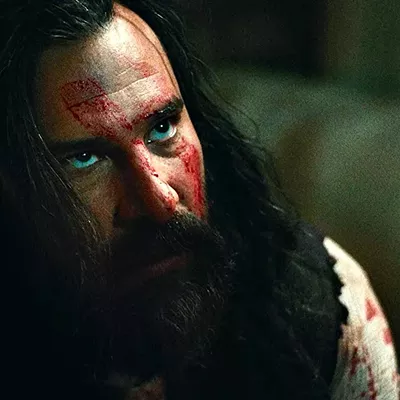However, with Kingdom of Heaven, he occasionally dips into snooze land. I don't really think this is his fault, because overall, this is a perfectly well-executed film. The problem is that movies require lead characters, and characters require actors to bring them to life, and "actor" and "life" are terms that simply cannot be applied to Orlando Bloom.
Bloom plays Balian, a blacksmith whose wife has just committed suicide, partly because she lives in France, and partly because she lives in the year 1184. Shortly after her headless corpse is buried, the village priest tells Balian that God has abandoned him to go off and make movies for Mel Gibson.
In retaliation for this, Balian kills the priest and heads to the holy land where he hopes to find redemption. And by redemption, he apparently means Princess Sibylla, played by the incredibly hot Eva Green in one of her first fully clothed roles.
This is all good material for a story, and it's the kind of material that Ridley Scott handles very well. There are fields of soldiers in epic battles, walled cities, leper kings, palace intrigues, religious wars and people in the sort of armor that a Humvee would kill for. Scott is better at dealing with this kind of stuff than almost any director ever. His battle scenes are loud and noisy, and yet incredibly clear. As a viewer, you're never confused about who's hitting who or why or who's winning or what that thing sticking out of that guy's eye socket is.
Scott also has a great visual sensibility when it comes to art direction. His king of Jerusalem is a leper who covers his horribly disfigured face with a variety of intricately inscribed metal masks. His Saladin is plated in golden scale mail and majestic robes. His Templars look simultaneously evil and holy.
With all that covered, the only problem remaining is Orlando Bloom as Balian. He winds up becoming a baron when the father he never met (played so well by Liam Neeson that you just wish Neeson would also play the role of Balian) stops by to say, "Hey, I did your mom a long time ago, so, like, now you're a baron." With that, he's off to take over a baronetcy near Jerusalem and to fight the Saracens and woo the ladies and be a hero for the ages.
When doing such things, you'd think one would show more expression than the occasional narrowed eyes, but that's the complete range of Bloom's expression. Maybe he was poorly directed; maybe he simply has no ability to act; maybe his father was Ambassador Sarek, but whatever the cause, Bloom is not only stiff; he's also completely lacking in charisma.
And that's a big problem when he's supposed to play the epic/romantic lead. It becomes even more pronounced with the logical leaps in Balian's character: Though he was never more than a blacksmith, as soon as he meets his father, he becomes an expert swordsman, a master military strategist, an agricultural engineer and a siege technician. That's hard to believe, and even harder when the actor playing the part seems not so much heroic as moody and uninterested.
It's too bad that Bloom had to screw up this film, because there are a lot of other good actors in it, any one of whom could have filled Bloom's iron-clad shoes. Aside from the aforementioned Liam Neeson, there's the inimitable David Thewlis doing a bang-up job as a philosophical knight, Jeremy Irons showing he still has chops in the part of Tiberius, Marshal of Jerusalem, and, supposedly, Edward Norton plays the part of the leper King Baldwin. You only get one look at his face, and he looks a lot more like Viktor Yuschenko than Ed Norton, but unless Yuschenko has suddenly become a great actor, I guess I'll have to believe what the final credits tell me.
Other than Bloom's acting and the credulity-stretching powers of his character, the only downside to this film is some politically correct speechifying. It didn't bother me, but I could see where Balian's monologue about Muslims, Christians and Jews living together in peace in Jerusalem could take one out of the movie and into a current-events course. Still, on the whole, even these fit in with the overall theme of the film. Kingdom of Heaven does neatly illustrate a time when people of various faiths lived together in a shaky peace. It's a sumptuous, well-finished film, and if it wasn't hamstrung by the casting of a marionette in the lead role, I think it'd be a real winner.











